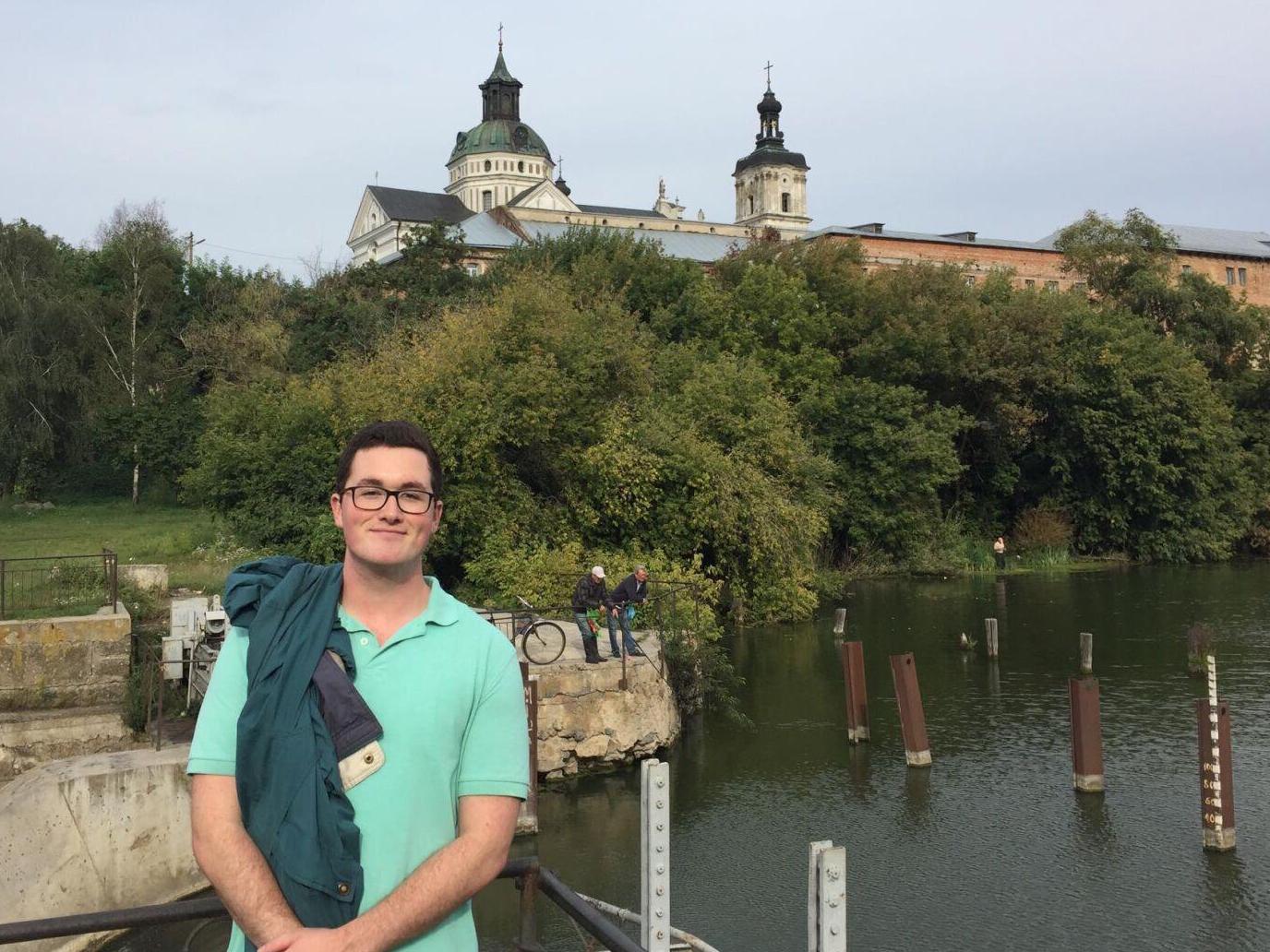Robert Minton '18 shares insights into the effect leaving Ukraine has had on him and those closest to him.
After a 30-minute monologue about my experience leaving Ukraine and saying goodbye to the life I had built over the past four years, my friend at the other end of the phone line began to vent about things in his life. He lives in New York, and this was the first time we had spoken since the war started. Suddenly he stopped himself and said, “You know what, I can’t complain. You literally fled a war zone.”
Six months prior, my wife and I had moved into a cozy new apartment in Uzhhorod, a neoclassical-style town on the western border of Ukraine. We had been waiting to move in for what seemed like ages, and after finally getting the keys, we began the conscious and subconscious process of turning it from a random apartment 10 minutes away from the city center into somewhere we could call home.
By late February 2022 we were in Kladno, an industrial town of 70,000 about 20 miles away from Prague, in an unfamiliar room in an unfamiliar country, having to start all over again — again.
I had spent a year and a half with the Peace Corps in Ukraine before being evacuated in March 2020 at the onset of the COVID-19 pandemic. Within 24 hours, I had to pack all my stuff, say goodbye to anyone I could find and leave my then-girlfriend, Alina, indefinitely. For the next three months, Alina and I talked on the phone twice a day, waiting patiently to be reunited. After the borders reopened, I bought the first ticket available, and in July 2020 I was back in Ukraine — this time without the stability and support of the Peace Corps, but instead with the woman whom I fully intended to marry.
That summer we reunited at the train station, and from that point on we began building our lives together. I went from teaching in person at a school to doing it online, having to essentially build a career from scratch in order to return to the woman and country that I had grown to love. It took me more than half a year to learn the intricacies of English grammar, get comfortable teaching via Zoom, find consistent students and (the most nightmarish of all) figure out taxes as a freelancing expat. After losing so much due to COVID, toward the end of 2021 I finally felt like I had built up my life again to a stable and comfortable position. That came to a halt when 2022 arrived.
It’s OK that we feel bad. We lost our home and the future it held. It’s OK that my friend in New York feels bad. And it’s OK if you feel bad, no matter what sort of unspeakable tragedies are happening in the world. Accepting the validity of sadness is one of the first steps in moving on.
There’s a Winston Churchill quote that comes to mind: “To build may have to be the slow and laborious task of years. To destroy can be the thoughtless act of a single day.” My wife and I left Ukraine on Feb. 14 — two weeks after our wedding — and are wondering if we will ever make it back or when Alina will see her family again. They stayed in Ukraine because men ages 18 to 60 are forbidden from leaving. We are wondering if her peers in the military will make it back alive, if our friends will get mobilized and if we’ll ever finish decorating the home we always dreamed about.
One night in Kladno, when Alina and I were discussing all of these losses, she stopped herself and said the exact same thing my friend in New York said: “How can we complain? There are children in Bucha right now who will never see their parents again. There are Ukrainians living in an occupied Kherson, and people who don’t have a home to go back to. How can we complain?”
Compared to everything else that was going on in Ukraine, it seemed like we were living a charmed life in Kladno. But compared to my friend in New York, us being displaced, almost out of work and separated from friends and family in a war zone felt like an unparalleled horror. While there will always be people who are suffering worse than you, that fact shouldn’t undermine anything that you’re going through. Just because someone is suffering more, it doesn’t mean your suffering isn’t valid. That’s what I told my friend in New York and that’s what I told my wife.
It’s OK that we feel bad. We lost our home and the future it held. It’s OK that my friend in New York feels bad. And it’s OK if you feel bad, no matter what sort of unspeakable tragedies are happening in the world. Accepting the validity of sadness is one of the first steps in moving on.
Now my wife and I are just wondering what the next steps are as we resume our lives away from the place we call home.
Robert Minton ’18 is a teacher, former Peace Corps volunteer and the author of “Slipping on the Ice: A Collection of Stories from a Peace Corps Ukraine Volunteer.” He currently lives in Prague.



